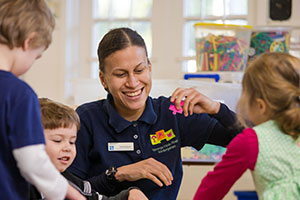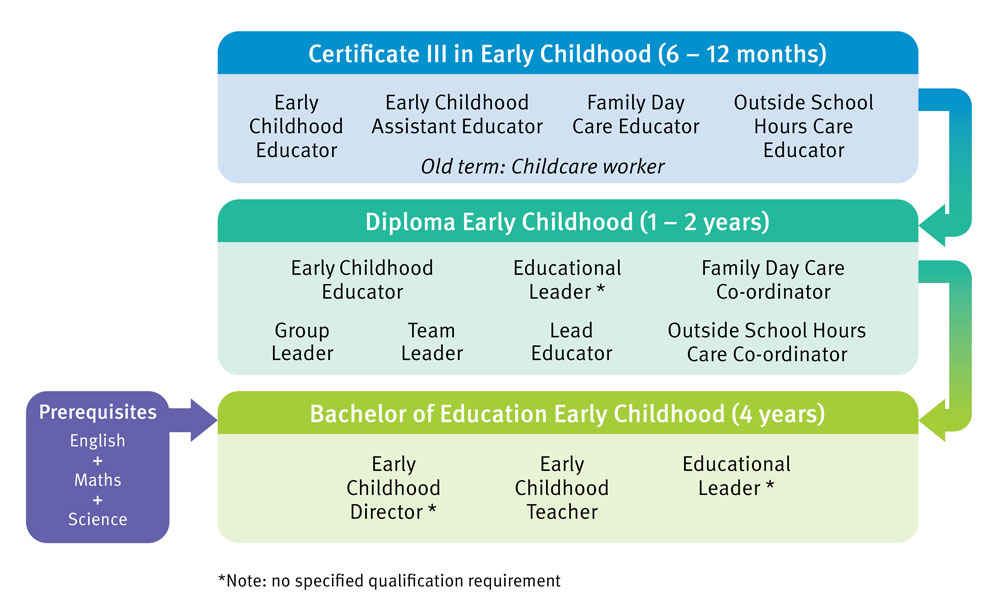The
Australian Children's Education and Care Quality Authority (ACECQA) oversees the implementation and administration of the
National Quality Framework (NQF). Most services are approved and regulated under the NQF. The NQF sets out the minimum qualification requirements for staff working in children's education and care services.
Approved early childhood qualifications
Michaela started her Certificate III at school and is now working and studying to be an early childhood teacher.

‘Studying my Bachelors and knowing that the staff are there every step of the way … Studying and having a hands-on learning experience from the staff and the children … it’s amazing.’ – Michaela
Early childhood services have to employ staff who hold, or are studying towards, a nationally approved qualification to comply with the
National Quality Framework. While different service types have slightly different requirements, there are generally 3 levels of
nationally approved qualifications to work in early childhood. These are as follows:
Qualifications and service positions
As a director, Mel enjoys supporting her educators to earn while they learn.
‘Working with educators … supporting and encouraging them to finish their Certificate III so they can build on their skill set and their knowledge. Not only is it rewarding to mentor them … at the end, you have another quality educator on your team.’ – Mel
The Australian Children’s Education and Care Quality Authority (ACECQA) is the national body responsible for approving and publishing the
lists of all relevant qualifications for educators working in the early childhood education and care sector across Australia.
Your qualification and experience will generally determine your position within an early childhood service. This diagram provides some examples of possible role titles you could take on with each qualification level.

Infographic shows 3 sections and each has an arrow pointing to the section below.
Certificate III in Early Childhood (6–12 months)
Early Childhood Educator
Early Childhood Assistant Educator
Family Day Care Educator
Outside School Hours Care Educator
Below these 4 roles, text says 'Old term: Childcare worker
Diploma Early Childhood (1–2 years)
Early Childhood Educator
Educational Leader*
Family Day Care Co-ordinator
Group Leader
Team Leader
Lead Educator
Outside School Hours Care Co-ordinator
Bachelor of Education Early Childhood (4 years)
Early Childhood Director*
Early Childhood Teacher
Educational Leader*
Below each of these sections, text says '*Note: no specified qualification requirement'.
To the left of the 'Bachelor of Education Early Childhood (4 years)' section, there is a box that says 'Prerequisites: English + Maths + Science'. This box has an arrow pointing to the 'Bachelor of Education Early Childhood (4 years)' section.
Note: Outside school hours care (OSHC) qualifications are broader in range than just early childhood. An educator can be 1-year or 2-year qualified or equivalent, in an approved area of study such as nursing, sport and recreation or behavioural science. For example, you can work as an OSHC educator while you are studying your bachelor degree in behavioural science.
Bachelor Degree or higher—University
Lara finished school and went straight into a teaching degree. She was offered a job on her first practicum placement.
‘While studying my Bachelor in Early Childhood teaching, I am balancing my time with work… They are really supporting me and if I need time off, I can organise that with them.’ – Lara
Early childhood teachers (ECTs) require a nationally approved bachelor degree or higher with an early childhood specialisation. Each university or higher education provider will have their own qualification titles and subject selections. You can study online or on campus if you prefer.
The steps to become an early childhood teacher are similar to becoming a school teacher. In fact, some nationally approved ECT qualifications also enable you to teach in the early years of school.
Pathways
There are a number of pathways to a nationally approved ECT qualification, depending on where you are on your career journey.
Start your degree at school
You can start your degree at school with
several Queensland universities offering programs to start degree subjects at school, or direct entry once you graduate from school. There are prerequisites to study teaching at university – if you are in school, this means choosing the right senior subjects.
Changing careers
You may not have thought about university when leaving school and have now decided to become an ECT. You can either enter through the
Queensland Tertiary Admissions Centre (QTAC) or through the university application process at your preferred university.
You will have to talk to your university about how to manage prerequisites. Each university will be slightly different. Prerequisites for early childhood teaching include English, maths and science.
If you already hold:
- an
approved early childhood qualification speak to a university about credit towards an early childhood teaching Bachelor Degree.
- a
degree in another field or a
secondary teaching degree you can do post-graduate studies. Check the ACECQA website for approved qualification options in Masters and Graduate Certifications.
- a
primary teaching degree check if it is listed as an
ACECQA approved qualification. If it isn't on the list, you can enrol in post-graduate studies at a university; or
if you are a registered teacher, enrol in an approved Certificate III or higher early childhood qualification.
Teacher registration is not currently required by law to work as an ECT in Queensland, however some employers seek ECTs who are registered. The
Queensland College of Teachers can help with registration requirements.
Visit
course seeker to find a teaching qualification that is right for you.
Financial assistance
The Australian Government has reduced fees significantly for eligible students undertaking education degrees through the
Job-ready Graduates Package. Eligible students can also be assisted to pay their tuition fees upfront via a
student loan.
Before you enrol in a qualification at any university, check that it is on the ACECQA
list of nationally approved early childhood teacher qualifications.
Certificate and Diploma—Vocational education
Nicole was encouraged and supported to work and study.
‘I initially went to TAFE Qld to do my studies in a certificate III then started work … I have since completed my diploma while working full time … I was really supported by my team and management to complete my study.’ – Nicole
Registered training organisations (RTOs) deliver Certificate and Diploma level qualifications in early childhood education and care or school aged care. There are a number of RTOs delivering early childhood vocational education and training (VET) qualifications, including TAFE Queensland.
There are many pathways you can take to become qualified:
-
School-based traineeships and apprenticeships (VET in school) that count towards your Queensland Certificate of Education (QCE)
-
Employed as an apprentice (Diploma) or as a trainee (Certificate III)
-
Study full-time at an RTO of your choice
-
Study part-time at an RTO and work in an early childhood service.
Financial assistance
You may be eligible to enrol in early childhood qualifications and training with free or significantly reduced fees. Visit
Job Trainer Queensland and the
Queensland Skills Gateway to
check your eligibility.
Before you enrol in a qualification at any registered training organisation, check that it is on the
ACECQA list of nationally approved early childhood qualifications.
If you need something explained further please email your query to ecec@qed.qld.gov.au.